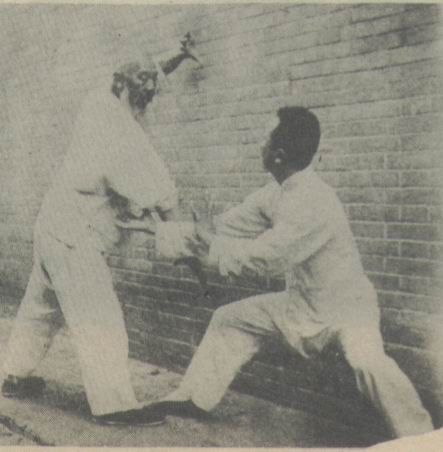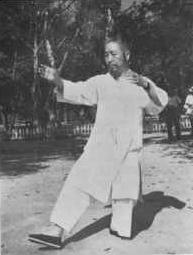A question all taiji students should ask themselves is, what is the value of Taiji? Is the value in the maintenance of tradition, in the lineage of the style, in the comradery of the classes, in the health benefits or in the fighting skill? Each of these answers will have their own advocates, but there is an interesting tendency in traditional arts. It is the tendency to weight value more on the things that DON'T involve the practice than those that do!
On my website I can see where visitors go and this often highlights some interesting realities. For instance, most people who arrive on the site go from the home page - straight to the lineage page. That is the FIRST thing people want to know. Who trained you and when, and who trained them, and who trained their teachers and so on. In some ways this is understandable. People wanting to learn something want to know that they are learning that thing, lineage points to some type of 'authenticity' in the practice or method. Certainly to learn Tai Chi, the person teaching must have learnt Tai Chi.
But there is a big secret with Lineage that is hidden in plane site. It is rarely the purest lineages that contain the best exponents. Time and again we see masters emerge in this art or that and become famous for their skill, without ever being an inheritor. But I will go further and state with some certainty that every school also has a 'grey man'. The individual no one has ever heard of, that is one of the best in the school.
 It may be that they have a successful job and never wanted to do anything but train, it may be that they rejected discipleship for various reasons, but their skills are very often the apex of the style, they are the top tier. There are stories about many masters with students like this from both the Japanese and Chinese traditional arts. People would say 'such and such is one of the best in the school, but he keeps himself to himself and isn’t interested in the limelight'. In fact, I would wager that the majority of the top exponents in most martial arts are never heard of.
It may be that they have a successful job and never wanted to do anything but train, it may be that they rejected discipleship for various reasons, but their skills are very often the apex of the style, they are the top tier. There are stories about many masters with students like this from both the Japanese and Chinese traditional arts. People would say 'such and such is one of the best in the school, but he keeps himself to himself and isn’t interested in the limelight'. In fact, I would wager that the majority of the top exponents in most martial arts are never heard of.
Why would it be the case that those whom aren’t disciples, or aren’t teachers, or aren’t known - have the best skills? Simply that they have no other focus but to train, and it is training after all that creates great skill.
If you are the inheritor of the Yang or Chen Family Tai Chi, there is a weight of responsibility on your shoulders. You must travel, teach, promote and display the art with the most appealing methods to the audience. This is all time you are not training. If you are a disciple, you must help the master, again, spreading the art, setting up organisations and schools, working on building the art in your region etc. Again, this is all time not training.
With none of those considerations a student is free - they are free to train and embody the art! We need only look at history to find big names, who's students may have created 'lineages', but who's own approach was very different. Yang lu chan, Li Cun Yi, Zhang Zao Dong, Wang Lai Sheng, Sun Lu Tang… this golden age of internal arts was characterised by people who innovated. Their styles were NOT what came before, they were not carbon copies of their teachers, they did not represent purity. They were the innovators and the rebels. They did not stagnate behind their teachers accomplishments, and perform parlour tricks to pull in more students for their 'lineage'. All of these names cross trained, added, changed, adapted and innovated.
But nowadays, if a non-lineage coach changes Taiji or another traditional art, it is immediately labelled wrong. By that rationale everything these previously mentioned masters did was wrong. Zhang Zao Dongs Ba gua was wrong, as it wasn’t identical to Cheng Ting Huas, Li Cun Yi's Xing Yi was Wrong because it wasn’t identical to Guo YunShens. You see the point.
 I remember going to a seminar with a well known internal arts master. The master was extremely skilled, and with him was a number of students whom I knew. None of them were really approaching the masters level, even though they were disciples. However, during one of the partner exchanges, I got paired with a quiet guy that I hadn’t noticed before. As soon as we touched hands I knew this guy had something. He felt like the master!! I immediately asked, "who do you train with?" as he didn’t appear to be with the group of main disciples. "I train with teacher. I have been with him 25 years" Pointing at the master. I asked if he was a disciple, he chuckled and said "No I have an office job!". He was the grey man of the group. By far the best in the room but with no air of pomp, not uniform, no attitude and hardly noticeable.
I remember going to a seminar with a well known internal arts master. The master was extremely skilled, and with him was a number of students whom I knew. None of them were really approaching the masters level, even though they were disciples. However, during one of the partner exchanges, I got paired with a quiet guy that I hadn’t noticed before. As soon as we touched hands I knew this guy had something. He felt like the master!! I immediately asked, "who do you train with?" as he didn’t appear to be with the group of main disciples. "I train with teacher. I have been with him 25 years" Pointing at the master. I asked if he was a disciple, he chuckled and said "No I have an office job!". He was the grey man of the group. By far the best in the room but with no air of pomp, not uniform, no attitude and hardly noticeable.
All of this is even more true in the modern age, where the Lineage of this art or that is treated as a commodity. The arts inheritors can make big bucks if they have the 'real thing'. A phenomena often not discussed is how teachers will make things up stating 'This is what (insert famous master here) taught me as the secret of the school.' Everyone who wants to master the style will then go and buy it, because, why would the pure lineage inheritor lie! The more time goes on ... the more 'secret forms' etc we see.
Ultimately, if true transformation of self is the focus, or if fighting skill is the focus then we should be seeking out those who can translate or relate the practices that will get us there, with no consideration for who taught them. We should be looking to see if the practices themselves do as they state. If they do - keep going - if they dont - move on.
A true teacher or coach may even 'Change' the art to suit you! This is what Yang Cheng Fu did with the famous Cheng Man Ching - he adapted the original yang taiji style to best produce the health effects that Mr Cheng needed to heal. As a result Cheng Man Chings Taiji is different to Yang Cheng Fus other lines of Yang Style Taiji. To the lineage obsessives, Chen Man Ching would have been doing Yang Style 'Wrong ... but of course he was not.
I guess the real lesson from history is to almost avoid the lineage holders. The people teaching form movements to rooms of 100 people, the people with 500 disciples - You are very unlikely to get anything of worth from them. Instead seek the 'Grey man' the innovators outside of the circle who can still produce the real results!